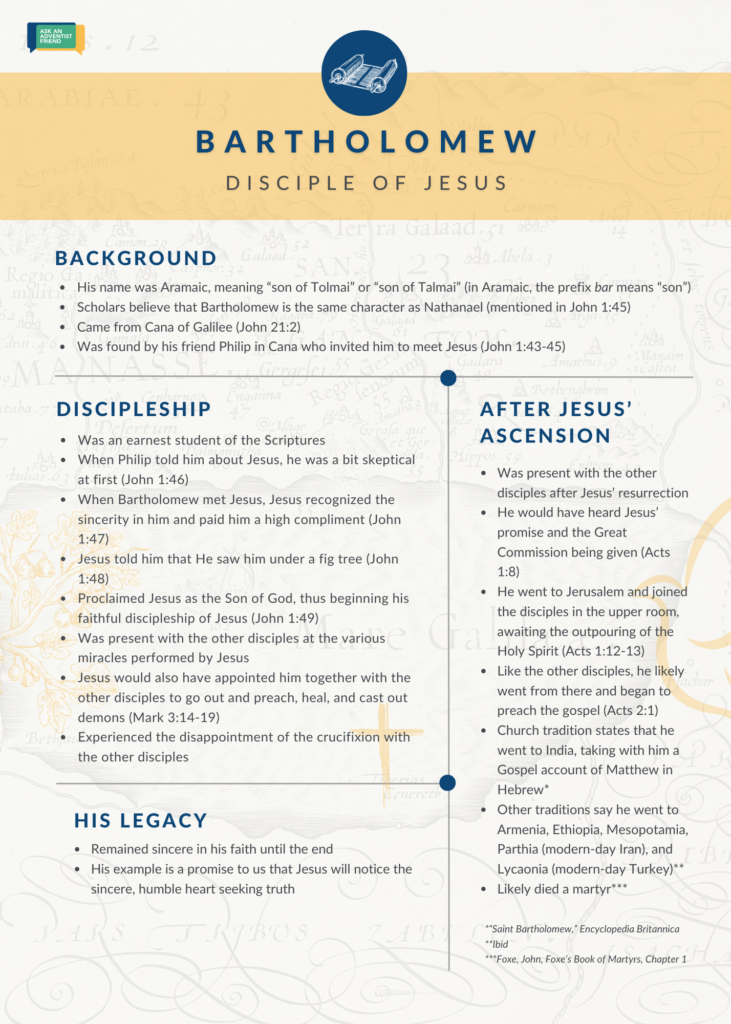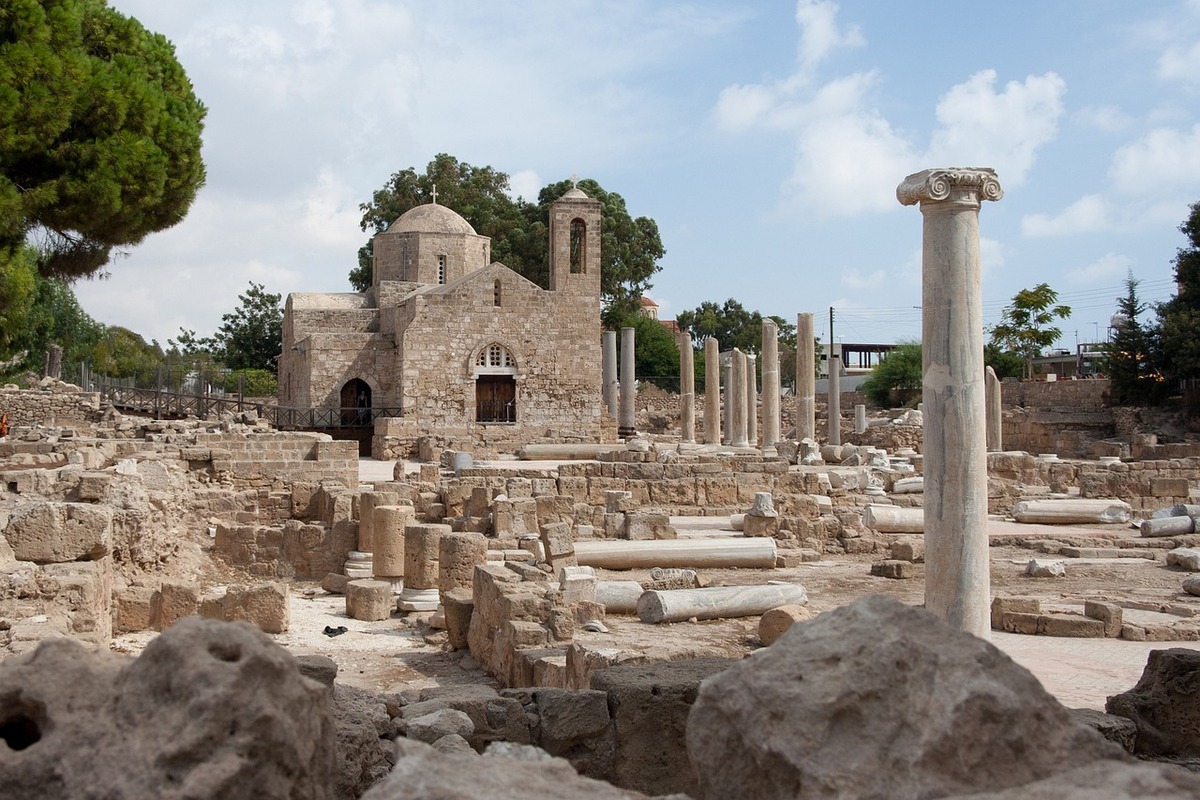What the Bible Says About Bartholomew the Apostle

Bartholomew is a lesser-known figure in the New Testament who is mentioned in each of the lists of the 12 disciples of Jesus Christ (Matthew 10:2-4; Mark 3:14-19; Luke 6:13-16). He is most likely the same individual as Nathanael (see John 1), someone who was sincerely studying the Scriptures and waiting for the Messiah to come.
His wait was no doubt rewarded when Jesus appointed him as one of the 12, and he had the opportunity to witness the Messiah’s healing, teaching, and preaching ministry. He also experienced the outpouring of the Holy Spirit at Pentecost, spurring his work as a missionary for Jesus.
So, let’s dig deeper into what the Bible, as well as some other historical Christian sources, can teach us about Bartholomew. We’ll cover:
Bartholomew’s background
The first time we read about Bartholomew is in Matthew 10:2-4:
“The names of the twelve apostles are these: first, Simon, who is called Peter, and Andrew his brother; James the son of Zebedee, and John his brother; Philip and Bartholomew; Thomas and Matthew the tax collector; James the son of Alphaeus, and Thaddaeus; Simon the Zealot, and Judas Iscariot, who betrayed him” (ESV).
The name Bartholomew gives us hints about his lineage. It was an Aramaic name that meant “son of Tolmai” or “son of Talmai” (in Aramaic, bar means “son”).1
Is Batholomew also known as Nathanael in the Bible?
Scholars believe that Bartholomew is the same person as Nathanael (mentioned in John 1:45). One commentary explains it like this:
“Nathanael was probably his own personal name. The Synoptic Gospels [Matthew, Mark, and Luke] make no mention of Nathanael, and the Gospel of John says nothing of Bartholomew. John mentions Nathanael, together with others of the Twelve, in a setting where it seems that none but disciples of the inner circle of Twelve were present (see ch. 21:2). Thus there is no valid reason for doubting that the two names Bartholomew and Nathanael refer to the same person.”2
In this case, Bartholomew was likely his family name, and Nathanael would have been his first name. It was common for Jews in the first century to have two names.
According to John 21:2, he came from Cana of Galilee. And it’s there that his friend Philip found him and invited him to meet Jesus (John 1:43-45).
Bartholomew’s discipleship
Any details beyond what’s already been mentioned, however, we’ll have to draw from other sources. Bartholomew is mentioned only a handful of times in the Gospel accounts.
The most we know about Bartholomew from Scripture, though, comes from his first encounter with Jesus (John 1:45-50).
The account gives us evidence of a close connection between Bartholomew and Philip, the disciple who invited him to meet Jesus. Interestingly, Bartholomew is also always listed right after Philip when the disciples are named in the Bible (Matthew 10:2-4; Mark 3:14-19; Luke 6:13-16).
When Philip found Bartholomew, he exclaimed:
“We have found him of whom Moses in the Law and also the prophets wrote, Jesus of Nazareth, the son of Joseph” (John 1:45, ESV).
This tells us that both Philip and Bartholomew were earnest students of the Scriptures. They were eager for the promised Messiah of the Old Testament.
And yet, Bartholomew was a bit skeptical: “Can anything good come out of Nazareth?” (verse 46, ESV).
Rather than arguing with him, Philip simply invited him to “come and see” (verse 46). And so, Bartholomew did.
He wasn’t disappointed.
When Jesus saw Bartholomew coming toward Him, He said, “Behold, an Israelite indeed, in whom there is no deceit!” ( verse 47, ESV).
What a high compliment! Jesus recognized the sincerity in him. Bible commentators note:
“Nathanael was one of that small but devout group who earnestly waited for ‘the consolation of Israel’ (see Luke 2:25) and aspired to the high ideals set before them by God.”3
Bartholomew was taken aback. “How do You know me?” he asked (verse 48, NKJV).
Jesus responded, “Before Philip called you, when you were under the fig tree, I saw you” (verse 48, NKJV).
Jesus had taken notice of his sincere longing for the Messiah. He knew him inside and out. This realization made Bartholomew exclaim:
“Rabbi, You are the Son of God! You are the King of Israel” (verse 49, ESV).
And so began his faithful discipleship with Jesus.
He got to witness first-hand what the Savior he had so desperately waited for was like. He experienced many of the key events of Jesus’ ministry, such as the feeding of the 5,000, as well as Jesus’ parables, sermons, and healing miracles.
During that time, Jesus sent him and the other disciples to preach, cast out demons, and serve those in need (Mark 3:14-19). Naturally, these experiences would’ve only increased his belief in Jesus and his understanding of His character.
But then came Jesus’ crucifixion. Bartholomew, like the other disciples, must have been frightened and confused by this turn of events (Matthew 26: 31, 56).
How could the savior he’d been waiting for…die?
But as he would discover, God’s plan didn’t end with the death of Jesus.

Photo by Manuel Sardo on Unsplash
Bartholomew and the other disciples were fishing with Simon Peter, no doubt still struggling with the shock and discouragement of Jesus’ death, when they found they couldn’t catch any fish (John 21:1-3).
But then, a man from the shore called out to them and told them to throw their net on the right side of their boat. When they followed his instruction, they ended up catching so many fish that they couldn’t even haul in their net (John 21:6).
It was then that the disciples realized this man was none other than Jesus, and that He’d been raised back to life (John 21:7,12).
Bartholomew and the other disciples must have been overcome with joy at the sight of their Savior.
But as Jesus would tell His disciples, their work wasn’t finished.
Bartholomew and the others would still have a role to play in telling others about Jesus and His gift of salvation.
Bartholomew’s life after Jesus’ ascension
Bartholomew was present at the ascension with the other disciples (except Judas) after Jesus’ resurrection.
He would’ve heard Jesus’ promise and commission for the disciples before He rose into Heaven: “But you will receive power when the Holy Spirit has come upon you, and you will be My witnesses in all Judea and Samaria, and to the end of the earth” (Acts 1:8, ESV).
Together with the other disciples, Bartholomew took those words to heart.
Acts 1:12-13 records that he went to Jerusalem and joined the disciples in the upper room. There, they prayed and waited for the outpouring of the Holy Spirit.
Acts 2 tells us the revolutionary results of those prayers. The disciples received the Holy Spirit “a rushing mighty wind,” and began to preach the good news of Jesus (verse 2, NKJV). All their fears were quieted, and they boldly shared about the one they loved.
Though we don’t know the details, we can assume that Bartholomew, like the other disciples, went from there and began to preach the Gospel as they were encouraged and empowered by the Holy Spirit.
According to a tradition taught by the church father Eusebius of Caesarea, Bartholomew went to India, taking with him “a Hebrew copy of The Gospel According to Matthew.”4
Other traditions say he went to Armenia, Ethiopia, Mesopotamia, Parthia (modern-day Iran), and Lycaonia (modern-day Turkey).5
Again, the Bible and other historical sources don’t tell us for sure, but it’s most likely that he died a martyr for his faith. Some sources suggest he was flayed and beheaded while others say he was crucified.6
Here’s a perspective expressed in Foxe’s Book of Martyrs about Bartholomew’s death:
“Preached in several countries, and having translated the Gospel of Matthew into the language of India, he propagated it in that country. He was at length cruelly beaten and then crucified by the impatient idolaters.”7
The bottom line is that Bartholomew was believed to have remained sincere and strong in his faith until the very end of his life. That he cherished his relationship with Jesus so much that he wasn’t willing to give it up for anything—not even to preserve his own life.
Bartholomew’s legacy

Photo by Fa Barboza on Unsplash
We may not know many details about Bartholomew the apostle, such as his life before following Christ, his day-to-day life as a disciple, or his accomplishments as an apostle. But what we do know about him leaves us a beautiful legacy.
He shows us what it looks like to have a heart sincerely seeking truth.
Nathanael, who we understand to be Bartholomew, was searching the Scriptures, wanting to be led by the Holy Spirit, wanting to see the Messiah (John 1:44-49). And Jesus took notice, commending him (verses 50-51).
His simple faith guided his journey as a disciple and later a missionary sharing the Gospel message. And his possible martyrdom means that he was making enough of a difference for Jesus that people would have taken notice.
But above all, Bartholomew’s example is a promise to us that Jesus indeed notices those who seek Him in sincerity and humility.
Even before Bartholomew met Jesus, Jesus knew Him. And it wasn’t just that Jesus had heard of him. He knew everything about him—his fears, disappointments, and dreams.
In the same way, Jesus knows us and longs to connect with us. He rewards everyone who seeks Him out. Even though it might seem like you’ve been waiting for a while, as Bartholomew waited for the Messiah, we can trust that Jesus answers when we call out to Him.
Today, we can follow Batholomew’s example by earnestly seeking Jesus in prayer and Bible study.
And as we search, we, like Bartholomew, will find a Savior and friend in Jesus.
Want to learn more about the disciples of Jesus? Brush up on all 12, or read about other lesser-known disciples like Thaddeus or James, son of Alphaeus.
- Metzger, Bruce, and Coogan, Michael, ed., The Oxford Companion to the Bible, pp. 75, 45. [↵]
- Seventh-day Adventist Bible Commentary, vol. 5, comment on Mark 3:18. [↵]
- Ibid., vol. 5, comment on John 1:47. [↵]
- “Saint Bartholomew,” Encyclopedia Britannica. [↵]
- Ibid. [↵]
- Ibid; Foxe, John, Foxe’s Book of Martyrs, chapter 1. [↵]
- Foxe. [↵]
Related pages
Questions about Adventists? Ask here!
Find answers to your questions about Seventh-day Adventists
More Answers
Why Many Seventh-day Adventists Choose a Vegetarian Diet
Why Many Seventh-day Adventists Choose a Vegetarian Diet?You may have an Adventist friend who is vegetarian, or maybe you’re attending a Seventh-day Adventist Church for the first time and notice the potluck doesn’t have any meat. This isn’t unusual in Adventism. In...
The Health Benefits of Fresh Air You Should Know About
The Health Benefits of Fresh Air You Should Know About“When you can’t breathe, nothing else matters,” the American Lung Association tells us. And while that’s true, the kind of air you’re breathing will determine the health benefits you experience. Breathing fresh...
What Do Seventh-day Adventists Choose to Eat?
What Do Seventh-day Adventists Choose to Eat?Food blogs overwhelm the internet; food fads are all the rage; and copycat and healthy versions of food are the subject of many a get-together. Eating—and eating the best way—is a big deal. And everybody has a different...
10 Incredible Ways Sunlight Can Improve Your Health
10 Incredible Ways Sunlight Can Improve Your HealthAre you concerned about sunlight’s negative effects? You might be the one who lathers on the sunscreen and covers up when you go outside. Or maybe you avoid being outside as much as possible. You might be surprised,...
Why Is Water So Important?
Why Is Water So Important?We all know that water is a substance we can’t live without. It quenches our thirst and keeps us hydrated on the inside. And it’s necessary for hygiene and cleansing on the outside too. But did you know that the cleansing properties of water...
Ellen White’s Writings and the Adventist Health Message
Seventh-day Adventists are known for their emphasis on healthy living. And Ellen G. White was a significant influence in the development of this priority and practice among Adventists.
Health Clinics
Ellen White and Adventist Healthcare—Ahead of Their Time Medical care in the mid-1800s was primitive, to say the least. Basic concepts we take for granted—such as proper handwashing or recognizing the dangers of bloodletting—were nonexistent. And doctors often had...
What Did Ellen White Teach about Vegetarianism?
What Did Ellen White Teach about Vegetarianism?One thing you might have heard about Seventh-day Adventists is their emphasis on a vegetarian lifestyle. If you’re wondering why that is, it goes back to our church’s humble beginnings: As Adventists studied the Bible,...
How Ellen White’s Teachings Can Improve Your Health
How Ellen White’s Teachings Can Improve Your Health Healthcare in the nineteenth century was said to leave “more disease than it took away” with its use of bloodletting and “medicines” like mercury and arsenic.1 As people questioned these methods, new approaches...
Change Your Perspective on Life with These 5 Mindsets
5 Biblical Mindsets to Change Your Life for the Better Sometimes, life is just plain hard. There’s no way around it. So would thinking about things differently really change anything? Our perspective on life, and everything it throws at us, affects more than we’re...
Bible Promises for When You’re Worried or Fearful
Bible Promises for When You’re Worried or Fearful The Bible is full of beautiful promises that can comfort us in a variety of situations. They can give us hope when we are hopeless, make us feel grateful for God’s love, and comfort us when we’re grieving or suffering....
12 Practical Ways to Overcome Worry
12 Practical Ways to Overcome Worry DISCLAIMER: This content is for informational purposes only. It does not constitute any professional medical advice and is not intended as a substitute for professional mental health therapy. It’s easy to get stuck in a cycle of...
How the Bible Talks About Worry, Fear, and Anxiety
How the Bible Talks About Worry, Fear, and Anxiety Worry and fear are the ingredients of anxiety. It’s easy to see how the world isn’t perfect—and the anticipation of a bad event or experience (that may or may not even happen) can end up draining the peace and...
How to Calm Anxious Thoughts, Using the Bible
How to Calm Anxious Thoughts, Using the Bible You were expecting a phone call from your daughter half an hour ago, and she still hasn’t called. She’s also not answering your calls. You feel your heart thumping as your thoughts race: What if she’s been in a car...
What You Should Know About the Adventist Health Studies
What You Should Know About the Adventist Health StudiesYou may have heard that Seventh-day Adventists care about health. But what you may not know is that Adventists have been the subjects of long-term research into lifestyle and health. Since 1958, researchers from...
Benefits of Sunlight
Yes, There Are Health Benefits of SunlightDespite the bad reputation it’s gotten, sunlight is generally associated with positivity, as shown by songs like “You Are My Sunshine,” or phrases that refer to delightful people as having a “sunny disposition.” There’s a...
Why Your Body Needs Rest for Optimal Health
Why Your Body Needs Rest for Optimal HealthStruggling to think straight? Wondering why you can’t remember that important tidbit you heard earlier today? Feeling like your emotions are about to explode? These are just some of the symptoms that can reveal your need for...
The Seventh-day Adventist Diet: One of Our Key Longevity Secrets
The Seventh-day Adventist Diet: One of Our Key Longevity SecretsOats, avocados, lentils, tofu—probably not what you first think of in a standard American diet. But if you show up at the home of an Adventist, chances are you may be served one of these staples. Out of a...
Why You Need Fresh Air
Why You Need Fresh Air“When you can’t breathe, nothing else matters,” the American Lung Association tells us. We couldn’t agree more! Breathing in clean air is an essential part of caring for our bodies, which God has given us. Together with other health principles,...
Sabbath Meal
Everything You Need to Know About Sabbath MealsFor Seventh-day Adventists, sharing a Sabbath meal with friends and family is one of the most special and memorable parts of the Sabbath. That’s why we want to share with you all about Sabbath meals and why they’re such a...
Adventists and Healthy Living
Adventists and Healthy LivingWhat’s the Adventist “Health Message” All About? One thing Seventh-day Adventists are known for is their emphasis on living healthy lives. Since our bodies are living temples of the Holy Spirit (1 Corinthians 6:19, 20), we strive to stay...
Water’s Importance—Physical Benefits and Spiritual Applications
Water’s Importance—Physical Benefits and Spiritual Applications We all know that water is a substance we can’t live without. Not only does it quench our thirst and keep us hydrated from the inside, but it’s necessary for hygiene and cleansing on the outside as well....
How Important is a “Day of Rest?”
How Important is a “Day of Rest?” Why God Created a Day for Downtime by Martin Casper Do you ever experience the feeling of complete overload? Do you feel like the only way you can get ahead is by slamming it 24/7? I hear these types of comments more and more...
7 Reasons Why a Day of Rest is Important
7 Reasons Why a Day of Rest is ImportantWe live in a fast-paced world. It seems as if success is measured in how much you can do in a short amount of time. (Extra points for the service or product that is available 24/7). The idea that we will be more successful if we...
How do Adventists choose what to eat?
How do Adventists choose what to eat?Every day, parents go through the ritual of getting their kids to eat what is healthy and good while trying to steer them away from what can hinder the growth of their developing bodies. Nutritionists work with their clients to...
How Can I Have a Better Marriage?
Is it possible to have a happy marriage?
Why are many Adventists Vegetarian?
Why are many Adventists Vegetarian?The diet intended for man is outlined in Genesis 1:29, “And God said, ‘See, I have given you every herb that yields seed which is on the face of all the earth, and every tree whose fruit yields seed; to you it shall be for food.’”...
Didn’t find your answer? Ask us!
We understand your concern of having questions but not knowing who to ask—we’ve felt it ourselves. When you’re ready to learn more about Adventists, send us a question! We know a thing or two about Adventists.
























